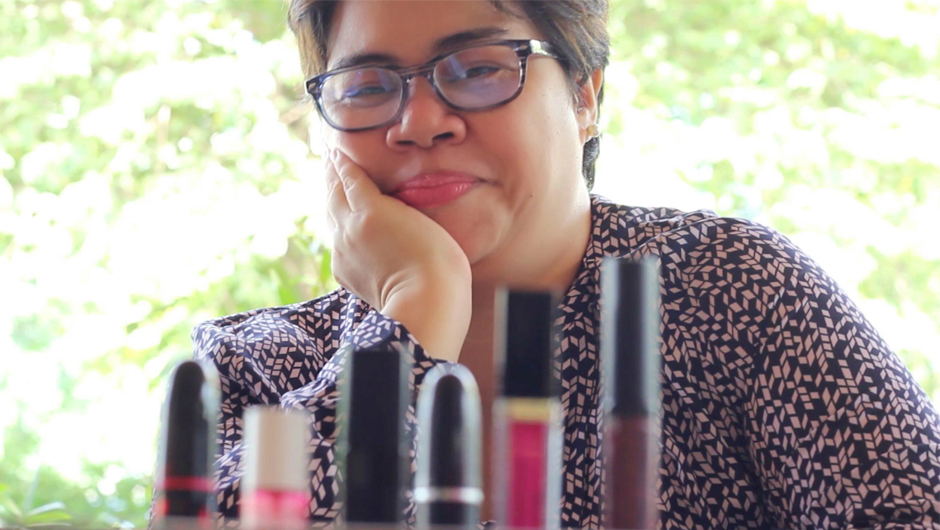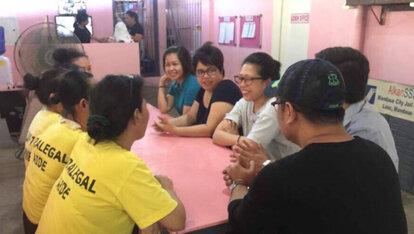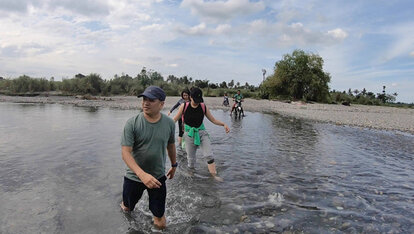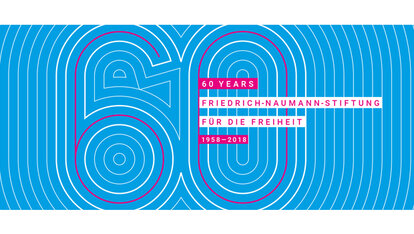Law as shield, lipstick as armor

It was 1:30 p.m. on a hot summer afternoon in Cebu, a city in the southern Philippines, and Cathy Alvarez and her guests haven’t had lunch. They went to a restaurant that served the best lechon in the area, and the place was full even at that time of the day. Cebu is said to have the most delicious lechon or roasted suckling pig, with the crunchiest skin and most flavorful meat.
When Alvarez and her companions finally got a table, they ordered a kilo of lechon. They devoured it with gusto, lining their mouths with oil, making their lips shimmer like they had lipstick.
That was her cue to bring out her cosmetic kit full of lipsticks. She lined them up, and showcased their colors, the palette as colorful as her life’s story.
Women don’t need knights in shining armor
Cathy Alvarez has been a lawyer for 16 years. Before she and her friends decided to set up their own non-profit organization, Alvarez was with the Humanitarian Legal Assistance Foundation (HLAF) where she did paralegal training for female inmates at the Mandaue City Jail in Cebu. For three years since 2014, she taught women detainees the law. In turn, they taught her how to wear lipstick.
Alvarez noticed that the women inmates would always come to the paralegal training wearing lipstick. “They felt helpless in jail. The only aspect in their lives which they had control of while they were in prison was how they looked,” observed Alvarez. “Putting on lipstick was their way of expressing themselves and finding freedom in dignity.”
Branded as the Lipstick Brigade, these women behind bars were empowered by their lipstick and their knowledge of the law. The paralegals, who were volunteer inmates, were expected to aid fellow detainees with their cases – assist them to write their affidavits and follow up on their court trial schedules through the jail officers, ultimately helping them get out of prison.
“Communities and the sectors, including women, have the capacity to learn and apply the laws themselves. Through the Lipstick Brigade I learned that women who know how to use the laws to protect their rights don’t need knights in shining armor, they only need a little lipstick,” said Alvarez.

The truth about law school
Alvarez earned her law degree from University of San Carlos, Cebu. She wanted to move to Manila for law school, but her parents did not permit her. Manila, which is 355 miles from Cebu, is too far a distance from home, especially for an only child like her.
She openly laid out her story—how the movie “A Few Good Men” inspired her to become a lawyer, and how choosing to become an alternative lawyer, an alternative path to the lucrative career of corporate law, defined her standard of success.
“’You can’t handle the truth!’ is a famous line in the movie ‘A Few Good Men’. That was the case for me in law school. The truth was it was so stressful, I would always have second thoughts about continuing on,” revealed Alvarez.
But she persevered, and before entering her third year, she joined the Ateneo Human Rights Center’s (AHRC) Summer Internship Program.
The Internship Program brought Alvarez to Quezon Province in 1998 to live with the Dumagat tribe, a group of indigenous people. She recalled that it was a “buwis buhay” (life-risking) trip. Her group had to traverse the Pacific Ocean to reach the ethnic community. “When it was time to get off the boat, I fell off and got soaked in ocean water. Then we had to go up the mountains while I was still dripping wet,” recounted Alvarez.
Immersing in the Dumagat community meant living with the most basic necessities. Alvarez and her 12 batch mates in the program stayed in a small dwelling – the space where they ate was the same area where they slept. They took a bath in the river where they had to be cautious of leeches.
The most memorable part of this adventure was Alvarez’ exposure to the land issues of the Dumagats. Mining operations of big corporations were driving them out of their land, away from their ancestral territories.
“We handled issues on ancestral domain and indigenous land rights. We learned to work with communities who may not have legal education but have practical knowledge and experience,” explained Alvarez. “It was a life-defining lesson of humility and trust – that as law students and even as lawyers, we can only impart advice based on our understanding of the law, but we have to have faith in the individuals and communities to decide what’s best for themselves.”
The Internship Program also opened her eyes to the truth that law doesn’t necessarily equate with justice. This strengthened her resolve to become an alternative lawyer and practice public interest law.

Learn the law, serve the people
AHRC recognizes that law students can contribute in addressing human rights violations and the lack of access to justice. In the week-long immersion phase of the Internship Program, interns are assigned to live with vulnerable sectors (e.g., indigenous peoples, fisherfolk, peasants) to get first-hand experience of life in marginalized and poverty-stricken areas. They conduct training in these communities and later take part in lobbying for law and policy reforms, and participate in public interest litigation.
Ateneo set up the program in 1987. “What we are doing here is planting the seeds of love of human rights in the minds of young interns who would later on become lawyers,” pointed out AHRC Executive Director Arpee Santiago. He also quoted former Philippine President Ramon Magsaysay who famously stated that “he who has less in life should have more in law.”
Many lawyers who are products of the AHRC’s Internship Program are active in alternative law practice. They work on non-profit terms (pro bono) to serve the poor and the marginalized.
Today, Alvarez is the Executive Director of her organization called StreetLawPh. She heads a group of Filipino lawyers working to address the stigma against and dehumanization of those who use drugs. The current drug war in the Philippines that has resulted in thousands of victims of extra-judicial killings has made her more active and vocal in the cause of human rights.
Alvarez admitted that sometimes, she would wonder why she chose to become an alternative lawyer. “There would be occasions when I would ask myself if I was still doing the right thing,” she said, bursting into tears as she talked about her family and how she must have failed their expectations of giving them a better life. “I still don’t own a car or a house, and that’s okay. Over the years, I’ve learned that I have my own standards for success. For me being a successful lawyer means being free, and helping others become free.”
With that thought, Alvarez’ lips then formed into a smile, still red with lipstick.
Law and Lipstick

The Friedrich Naumann Foundation for Freedom (FNF), a German liberal organization that promotes the protection of human rights, has been supporting the work of AHRC particularly its Internship Program since the 90s. FNF has sent a number of the program’s alumni, including Atty. Cathy Alvarez, to its International Academy for Leadership (IAF) in Gummersbach, Germany where they can network with their fellow human rights advocates around the globe.
As FNF celebrates its 60 years, it looks back to the contributions of its partners, and acknowledges their role in defending, strengthening, and increasing freedom.
Atty. Cathy Alvarez’ Freedom Journey is part of FNF Regional Office Southeast & East Asia’s feature series ‘60 Years Diaries’.